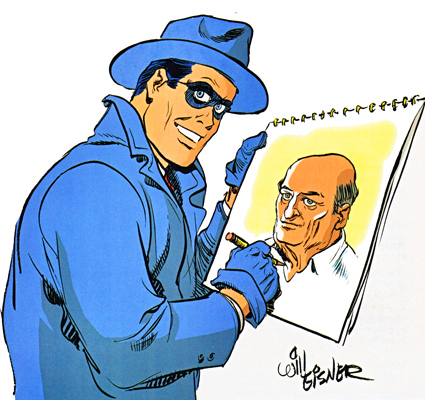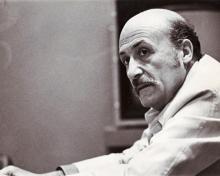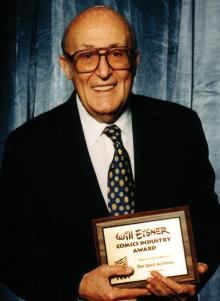Will Eisner
“Will Eisner” is a name that will always epitomize the best of the comics medium, both as a creator and as a person. Eisner’s career spanned eight decades, during which he pioneered not only in the comic book industry but also in the creation of graphic novels.

When Eisner first came to Comic-Con as a guest in 1975, he was best known as having been the creator of “The Spirit,” a comic strip that appeared in a Sunday supplement in newspapers during the 1940s and early 1950s. In the seven-page stories that appeared each week, he experimented with a number of storytelling techniques that were hugely influential on later comics creators. Eisner drew the wraparound cover for the Souvenir Book that year and received an Inkpot Award. Comics fans also knew him for having run one of the first “shops” that produced everything from superhero to western to jungle comics for a number of publishers during the Golden Age of comics. His shop is credited with creating Sheena, Dollman, and Blackhawk, among other characters.
In the 1950s Eisner founded the American Visuals Corporation, a commercial art company dedicated to creating comics, cartoons, and illustrations for educational and commercial purposes. Eisner resurrected Joe Dope, a bumbling soldier he had created during World War II, for PS Magazine, a publication he produced for the U.S. Army for over 20 years.
In the 1970s The Spirit was rediscovered by comics fans, and Eisner’s work was reprinted in magazine format. In 1978 he made a major shift in his career, producing his first book-length comics work, A Contract with God, which is credited with popularizing the term “graphic novel.” That was followed by several works in the 1980s, most notably The Dreamer (1986), a thinly veiled autobiographical depiction of his early days in the comics industry.

In 1988 he lent his name to the Will Eisner Comic Industry Awards because he strongly believed that more attention should be drawn to the wide variety of high-quality works being produced in his beloved medium. Will also believed that the retailers who made a special effort to promote and sell those works and to advance the comics medium should have their own award, which is why he proposed the Will Eisner Spirit of Comics Retailer Award in 1993. Will won a few awards himself at Comic-Con. In 1994 he was given the Bob Clampett Humanitarian Award, and over the years he was nominated for 12 Eisner Awards and won 5 of them (two for archival Spirit collections, two for original graphic novels, and one for his nonfiction book Graphic Storytelling).

At Comic-Con, Eisner was always easily accessible to fans and professionals alike. On his panel appearances he could be counted on to offer historical information about comics, basic how-to’s on creating comics, and insights on the direction of the industry. He was at home talking about everything from the international comics scene to alternative and indie comics. He was always on top of whatever was happening in business areas such as distribution and publishing, and he never hesitated to give advice to aspiring cartoonists. Whether he was signing autographs at a booth, strolling through the Exhibit Hall, or at an industry party, he made time for anyone who wanted to speak with him, and he treated all with respect.
Will Eisner died on January 3, 2005, just two months shy of his 88th birthday. But his legacy lives on at Comic-Con, both in the awards given in his name and in the thousands of professionals and fans who had the opportunity to learn from him.
For more information on Will Eisner, including the latest news about his work and its ongoing influence on comics, please visit willeisner.com.